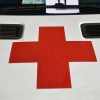
Myanmar's security forces are increasingly cracking down on the protest movement
Credit: Lynn Bo Bo/EPA/EFE-Shutterstock
Myanmar’s detained civilian leader Aung San Suu Kyi was hit with new charges of causing “fear and alarm” on Monday, in addition to previous accusations of illegally importing walkie talkies and violating the country’s natural disaster law.
The new charges were delivered during a court hearing conducted via video link. It was the first time Ms Suu Kyi’s legal team had seen her in person and they reported that she appeared to be in “good health.”
Khin Maung Zaw, her lawyer, said she had also been accused of a violation of communications laws. “We cannot say for sure how many more cases Daw Aung San Suu Kyi will face in this period,” he told reporters in the capital, Naypyitaw. “Anything can happen in this country at this time.”
She has been held in an undisclosed location since the February 1 coup when the military seized power, arrested the leaders of the democratically-elected government and said it would hold fresh elections in a year.
The initial charges carried sentences of up to three years and would disqualify Ms Suu Kyi from office. It is unclear what punishment the new charges would entail.

Protesters were met on Monday by clouds of tear gas
Credit: Reuters
Protesters took to the streets of Myanmar’s cities again on Monday despite Sunday experiencing the bloodiest day so far of anti-coup protests, when at least 18 died during a crackdown by security forces.
Demonstrators erected makeshift barricades using bamboo poles, tires and tree branches, and plastered pictures of coup leader General Min Aung Hlaing on the road, to delay police officers unwilling to step on his face.
They were met with tear gas, stun grenades and volleys of shots, although it was unclear if live ammunition was fired.
More details emerged on Monday of the devastating personal toll of Sunday’s violent crackdown. A poignant report on Reuters detailed how one of the dead, internet network engineer Nyi Nyi Aung Htet Naing, had posted on Facebook about the increasingly violent military response to pro-democracy protests.
“#How_Many_Dead_Bodies_UN_Need_To_Take_Action,” he wrote, in reference to the United Nations. He was one of the first to be shot in Myanmar’s biggest city of Yangon, near Hledan junction, a popular protest site.
Live video and photos sharing on social media during the day, not all of which could be independently verified, showed medics attending to victims with gaping, bleeding wounds.
In a worrying development, one front-line reporter said on social media that police had told people they were not shooting because they had been ordered to.

Protesters have laid coup leader General Min Aung Hlaing's image on the streets
Credit: Lynn Bo Bo/EPA-EFE/Shutterstock
“We shoot because we want to. Get inside your homes if you don’t want to die,” she quoted one as shouting.
Condemnation over the brutal treatment of pro-democracy supporters was swift from the international community, but Tom Andrews, the UN rapporteur for human rights in Myanmar, said action was needed more than stern statements.
He suggested a global arms embargo, and a coordination of tough and targeted sanctions against those responsible for the coup and their business interests.
Jake Sullivan, the US national security advisor, expressed alarm about the escalation of violence against peaceful protesters and condolences to the families of those who had lost their lives.
He said the US was preparing “additional actions to impose further costs on those responsible for this latest outbreak of violence and the recent coup.”
The Association of Southeast Asian Nations (Asean), a grouping of ten countries, some of whom have strong economic ties to Myanmar, are scheduled to hold a video conference on the coup, attended by a military representative, said Singapore’s foreign minister.






















































Свежие комментарии